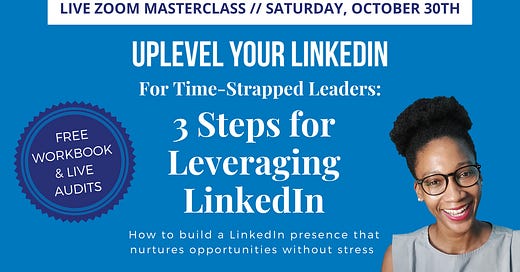Hi everyone, here’s what we have for you today:
When you report to great managers, find intentional ways to learn the most from your time with them. That’s the advice shared by Mercy Ojwang’-Kinyua, who has worked at tech startups including OkHi and Arifu.
What is your “default setting” as a collaborator? Hussein Kiarie from Pula shares how he learned and embraced his natural collaboration style - but was also quick to adapt when it didn’t work for some.
Does building your presence on LinkedIn feel time-intensive or uncomfortable? Join a free masterclass hosted by Akua on Oct 30th.
Read on for more details…
Identifying leadership "bad habits", intentionally learning from other leaders, and defaulting to transparency
Here are a few highlights from the conversation with Mercy:
Knowing what type of leader you don’t want to be is as important as the type of leader you do want to be: Mercy learned the hard way early on when she was thrust into a people management role, and recognized that she was practicing certain types of management tactics that weren’t effective. She learned that she didn’t want to be a leader that doesn’t take feedback and didn’t want to be a micromanager. She saw that she was picking up leadership “bad habits” from others around her, and didn’t yet have the self-awareness to avoid it at first.
If your company doesn’t have the budget for leadership training, take things into your own hands: When Mercy realized she needed support in developing her leadership skills, her request for formal training wasn’t granted. Instead, she took up reading books from top managers and listening to podcasts, which didn’t get her all the way to where she wanted to be, but certainly helped her in seeing new perspectives to management.
When you report to great managers, find intentional ways to learn the most from your time with them: When she had the opportunity to work directly with strong leaders, Mercy made sure to constantly ask questions during check-ins to hear their perspective, particularly on topics or situations where she herself would not have known how to handle it and was impressed by their response. Working alongside your manager isn’t always enough to get the full learnings, but rather ask them to reflect actively in order to understand their internal thought process.
Spending longer tours of duty at companies often allows you to grow and learn more: When you spend more years at a single company, you get to see how an organization adapts over time, and likely will have the opportunity to encounter more types of people and opportunities in a setting and framework that you increasingly are comfortable with. This is particularly true at fast-moving companies, where learning is accelerated and new and unexpected opportunities tend to arise more.
Defaulting to transparency can breed trust and remove information bottlenecks: In her fully remote team at OkHi Smart Addressing, the team tries as much as possible to keep all non-sensitive information and communication in team-wide public channels to avoid clashes caused by lack of information.
Embracing being a generalist and knowing when to pivot from your default team engagement strategy
Here are a few highlights from the conversation with Hussein:
Understand your “default setting” as a manager and collaborator: Hussein shares how he quickly learned and embraced his collaborative style of building relationships with others that he was working on projects. He spent time understanding and own his style, which allowed him to become comfortable working with juniors, seniors and peers alike to coordinate projects.
Know when to pivot your collaboration strategy if it’s not working: Hussein shared that “sometimes your default setting won’t work” and you have to adjust in order to achieve the desired outcome for your project.
Recognize whether you want to be a generalist or a specialist: This can make your career decisions and promotion path more clear and predictable. Hussein knew that he did not want to be a specialist, so this gave him the confidence and focus to identify specialists to fill key roles around him.
Embrace end-to-end workstream digitization to enable more robust performance conversations: Hussein shared how Pula leverages digitization, which they use to discover opportunities to further delight their customers and make their team’s day-to-day more rewarding.
Free Masterclass: Uplevel Your LinkedIn
This Saturday, 30 October Executive and Leadership Coach Akua will host a complimentary session aimed at time-strapped leaders looking to build their leadership presence. She is also presenting this same session during the annual International Coach Federation (ICF) conference this coming week.





